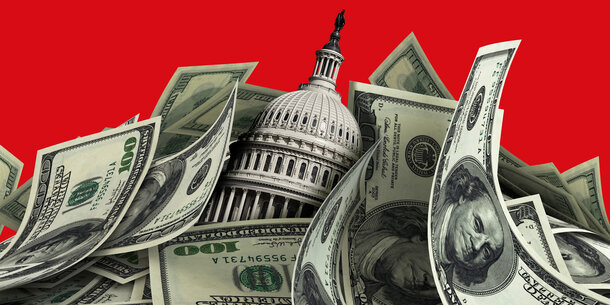As the Covid-19 pandemic continues to push the United States into its worst economic crisis since the Great Depression, our country finds itself on the precipice of a full-blown national housing emergency. An estimated 40 million Americans could face eviction in the coming months, with the federal eviction moratorium set to expire at the end of the year and the prospects of a second coronavirus relief package uncertain. But this nationwide upsurge in housing insecurity has not hit all Americans equally. Black Americans, already disproportionately impacted by the coronavirus, are especially at risk of losing their homes — a crisis deeply rooted in our big money political system.
Racial inequality has long been built into, and driven by, our country’s housing system. Following the abolition of slavery, federal, state, and local governments sanctioned a wide range of racist housing policies — including discriminatory zoning, restrictive covenants, and redlining — designed to enforce residential segregation. These policies led to the exclusion of Black people from the mid-20th century housing boom that enabled white families to amass wealth through the appreciation of real property. Moreover, they continue to undergird racial inequity in numerous other spheres of American life, from de facto segregation in public schools to racial disparities in exposure to pollution and toxic chemicals.
Notwithstanding the passage of the Fair Housing Act of 1968, which required the federal government to affirmatively further fair housing, our system of privately financed campaigns has propped up policies that too often serve the interests of real estate conglomerates and predatory lenders over those of Black working- and middle-class households. As a result, Black families today remain significantly more likely than their white counterparts to endure housing cost burdens that exceed 30 percent of their income, rendering many other expenses unaffordable and making savings all the more difficult. Amid the pandemic, only 26 percent of Black renters say they are highly confident they can continue to pay their rent, compared to nearly 50 percent of white renters.
It bears remembering that, when the pandemic struck, many Black families still had not recovered from the 2008 subprime mortgage crisis. Leading up to that crisis, the financial sector spent over $1 billion on campaign contributions, successfully pushing Congress to deregulate the mortgage industry and erode consumer protections. This deregulation allowed for the rapid expansion of predatory lending practices that targeted people of color for high-cost home loans that many could not afford. When the housing bubble burst, Black Americans were nearly twice as likely as white people to lose their homes to foreclosure.
Lawmakers provided little relief for these homeowners, but the subprime mortgage lenders and financial institutions that fueled the crisis — who had for years been among the most prolific campaign spenders — were among the most likely to benefit from the federal government’s bailout program. Ultimately, the mortgage crisis wiped out nearly an entire generation of Black wealth, leaving many families with limited savings to draw on to weather the present downturn.
Like the financial industry, certain real estate interests have also used campaign money to push policies that advance their own interests at the expense of communities of color. For example, over decades, large New York real estate companies exploited loopholes in state campaign finance laws that enabled them to donate virtually unlimited sums to state legislators who in turn blocked or rolled back affordable housing policies. Not surprisingly, these wins for big money real estate in Albany often emerged over the protests of the predominantly Black and Latino New York City tenants most impacted by the policies.
The Cares Act, passed last spring, proved no exception to this pattern of donor-driven policies exacerbating the affordable housing crisis. While the law’s limited housing protections provided only short-term relief to a subset of homeowners and renters, real estate interests — which contributed more than $34 million to super PACs in just the first four months of 2020 — successfully lobbied for an amendment that granted a $170 billion tax break to wealthy investors. More than 80 percent of the benefits of this provision will go to roughly 43,000 taxpayers with yearly incomes over $1 million, while Americans earning less than $100,000 will see less than 3 percent of the benefits.
Campaign finance reform can counter the corruptive influence of big money interests on housing policy. Last year, New York State closed its infamous “LLC loophole,” capping political spending by a limited liability corporation (a corporate structure favored by many of the state’s landlords and developers) at $5,000 annually. This reform, augmented by the growing number of candidates pledging to refuse contributions from real estate interests, paved the way for landmark tenant protection legislation that the state finally passed in 2019 after years of futile effort. And early this year, New York passed a small donor public financing program, creating a campaign finance system that promises to amplify the voices of working people in future fights for equitable housing policy.
With no end to the pandemic or the accompanying economic downturn in sight, we desperately need small donor public financing on a national scale to help tackle the systemic inequity of our housing system. Publicly financed elections, together with stricter contribution limits and increased transparency in political spending, would allow candidates to focus their campaigns and platforms on the priorities of everyday working Americans, not just those of wealthy donors.
These reforms are all included in the For the People Act (H.R. 1), a landmark democracy reform bill that passed the House last year. Without reforms like these, our elected officials remain unlikely to meet issues of housing security, and by extension, of racial equity, with the urgency they require.



